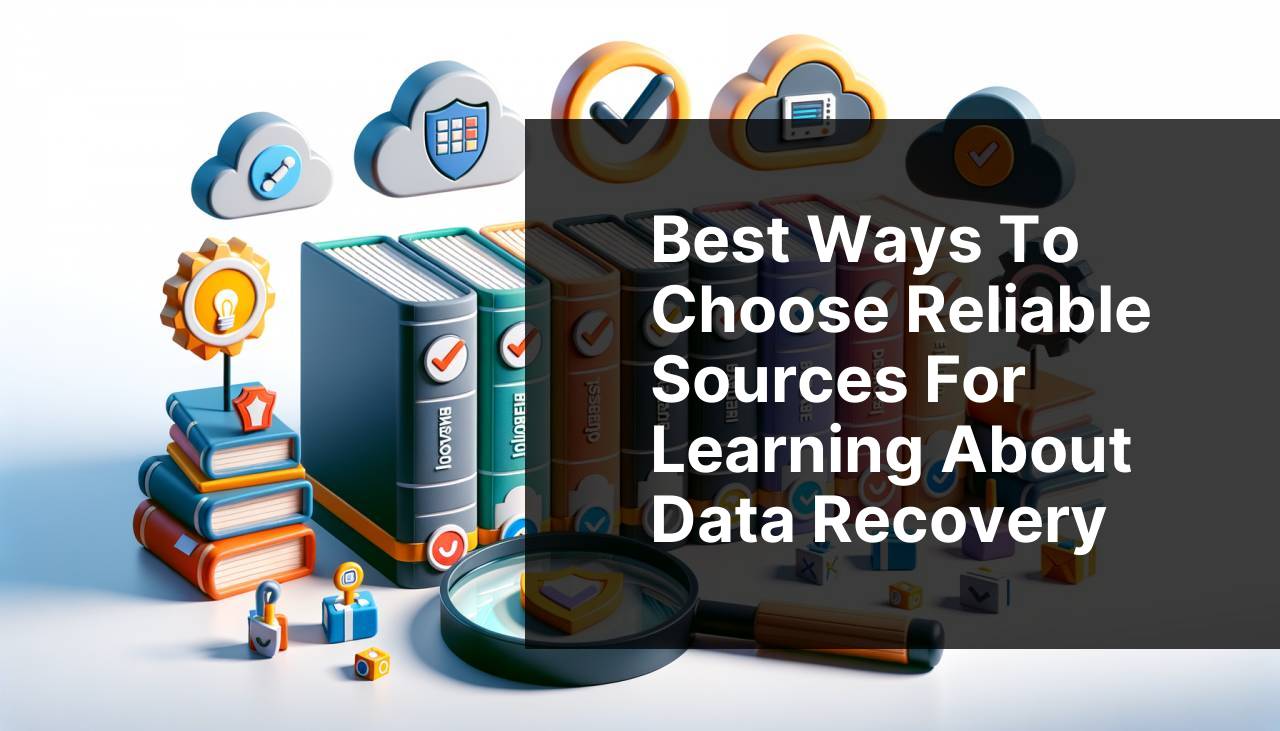Best Ways to Choose Reliable Sources for Learning About Data Recovery

Finding reliable and authoritative sources for learning about data recovery is crucial, especially in a field brimming with potential misinformation. Data recovery is a delicate and often complex process that involves retrieving lost, deleted, or corrupted data from storage devices. Understanding where to get the most accurate and dependable information can make all the difference. In this article, we’ll delve into various methods and strategies to choose the most trustworthy sources.
Common Scenarios:
Experiencing Data Loss 😱
- One of the most common scenarios is naturally when one faces data loss. Whether it’s due to accidental deletion, hardware failure, or corruption, the first instinct is to search for immediate solutions.
- In such a situation, it is vital to access reliable sources that provide accurate and effective methods for data recovery.
Learning for Professional Purposes 📚
- If you are a professional looking to expand your knowledge in data recovery, you will need comprehensive and detailed resources.
- Reliable sources will provide structured and well-researched content that can enhance your theoretical and practical understanding.
Setting Up a Data Recovery Business 💼
- For those planning to start a data recovery business, accessing dependable information is critical for establishing the right protocols and procedures.
- High-quality sources will ensure that you implement the best practices, thus providing superior service to your clients.
Step-by-Step Guide. How To Choose Reliable Sources For Learning About Data Recovery:
Method 1: Reading Expert Blogs 📝
- Start by looking for blogs written by experts in the field. These individuals often share their experiences, insights, and tips.
- An example of such a blog is the visit this Medium page for more on data recovery by Handy Recovery Advisor. The Medium page that is dedicated to Handy Recovery Advisor. It features articles related to data recovery, offering insights, tips, and guides.
- Search for specialized blogs that have a consistent history of publishing high-quality content.
- Check the credentials of the blog author to ensure they have relevant experience in data recovery.
Note: Not all blogs are created equal. It’s important to verify the credibility of the author and cross-check facts.
Conclusion: Expert blogs can be a treasure trove of information if you choose the right ones to follow.
Method 2: Utilizing Online Forums 💬
- Online forums like Reddit’s Data Recovery subreddit can be immensely helpful.
- Join these forums and participate in discussions to get real-life insights and advice from experienced members.
- Look for archived threads on the specific issues you’re dealing with; often, your question might have already been answered.
Note: Exercise caution as forums also have non-experts; validate the advice before acting on it.
Conclusion: Forums provide community support and practical advice, making them valuable resources for real-time problem-solving.
Method 3: Reading Technical Articles 📖
- Utilize platforms like IEEE Xplore for academic papers and technical articles on data recovery.
- These articles undergo rigorous peer review, ensuring their credibility and accuracy.
- Focus on the latest research to stay updated on new methods and technologies in data recovery.
Note: Some technical articles may be behind paywalls, but you can often access abstracts for free or find them through institutional subscriptions.
Conclusion: Technical articles are dense but offer some of the most reliable and scientifically backed information.
Method 4: Following Industry News 📰
- Stay updated with industry news through trusted platforms like ZDNet’s Data Management and Storage section.
- These sources often feature news, reviews, and insights into the latest trends and technologies in data recovery.
- Subscribe to newsletters from these platforms to get regular updates.
Note: Ensure the news platforms you follow are reputable and have a longstanding presence in the industry.
Conclusion: Industry news outlets can provide timely updates and reviews which are essential for staying current.
Method 5: Watching Video Tutorials 🎥
- YouTube channels like Tekzilla offer visual tutorials and guides on data recovery.
- Watch videos from certified professionals or popular tech reviewers.
- Utilize playlists dedicated to data recovery techniques to gain visual understanding and step-by-step guidance.
Note: Verify the credibility of the channel to ensure you’re getting accurate information.
Conclusion: Video tutorials are excellent for visual learners and can effectively convey complex procedures.
Precautions and Tips:
Essential Safety Measures 🛡
- When accessing information online, always use reputable sources. Unverified content can mislead you and potentially cause more damage to your data.
- Consider using verified data recovery software that comes highly recommended by experts and users alike. Some platforms also offer built-in tutorials for using their software efficiently.
- Avoid downloading or clicking on unknown links, as some could be malicious and further compromise your data.
Continual Learning and Updates 📚
- The field of data recovery is continually evolving with new technologies and methods. Stay updated by subscribing to industry newsletters and joining relevant professional groups on LinkedIn.
- Attend webinars and virtual conferences related to data recovery to hear from experts directly. This is also a great way to network with other professionals in the field.
Additional Insights
One critical aspect of learning about data recovery is understanding the different types of data loss, such as physical damage to hardware, logical damage to file systems, and accidental deletions. Each type requires unique methods and tools for successful recovery.
If you’re just starting your journey in data recovery, consider taking online courses or certifications. Platforms like Coursera and Udemy offer specialized courses on data recovery and digital forensics, taught by industry professionals.
Social media can also play a role in your learning. Follow experts on Twitter, join Facebook groups dedicated to data recovery, and even engage on Instagram where some professionals share tips and tricks in story formats.
Another practical tip is to engage in hands-on practice. Purchase older, less expensive hardware to practice data recovery techniques without the risk of damaging valuable data. Many online resources provide step-by-step guides for beginners and advanced users alike.
Lastly, never underestimate the value of a good book. There are numerous well-respected books on data recovery, such as “The Art of Data Recovery” by Jack Price or “Data Recovery Tips & Solutions” by Joseph Dean. Reading such material can provide comprehensive insights that are often missed in shorter articles or videos.
Conclusion:
Choosing reliable sources for learning about data recovery is essential whether you are facing data loss, looking to expand professional knowledge, or even setting up your business. By leveraging blogs, online forums, technical articles, industry news, and video tutorials, you can amass valuable information to guide you through various data recovery scenarios. Always verify the credibility of your sources and stay updated with continuous learning. For more information, visit CNET and TechRadar.
FAQ
What should you look for in a reliable data recovery learning source?
Trustworthy sources should have expert authors, current information, peer reviews, and demonstrated success in the field. Reputable websites and institutions offer validated and up-to-date content.
How can credentials add value to information about data recovery?
Authors with certifications and degrees ensure the provided guidance is credible and based on specialized knowledge, offering peace of mind about accuracy and reliability.
Why is peer-reviewed content important for learning about data recovery?
Peer-reviewed content has undergone scrutiny by other experts in the field, ensuring the information's credibility, reliability, and authenticity.
How do professional organizations contribute to reliable data recovery resources?
Organizations like the Data Management Association provide guidelines, best practices, and authoritative insights, helping you access well-researched and credible information.
What role do testimonials and user reviews play in assessing information sources?
Testimonials and user reviews offer firsthand accounts of the effectiveness and reliability of the information, reflecting real-world experiences and results.
What advantages do academic journals offer when learning about data recovery?
Academic journals contain rigorously researched and peer-reviewed articles, providing trustworthy data and advanced methodologies in the field of data recovery.
Are technology forums and communities valuable for data recovery insights?
Forums and online communities allow professionals to share experiences and solutions, offering practical advice and up-to-date information through collective knowledge.
Why should you check the date of publication for data recovery articles?
Data recovery methods evolve rapidly; checking the publication date ensures you’re accessing the latest and most relevant techniques and tools.
Can government websites be a good source for data recovery information?
Government websites offer unbiased, thorough, and authoritative information on best practices and guidelines, ensuring reliable and official content.
How can you verify the reliability of a data recovery company’s blog?
Examine the author’s credentials, the presence of peer reviews, and the consistency of updates to assess the reliability of a company's blog. For more in-depth guidelines and resources, you can visit ISACA and DAMA International.
